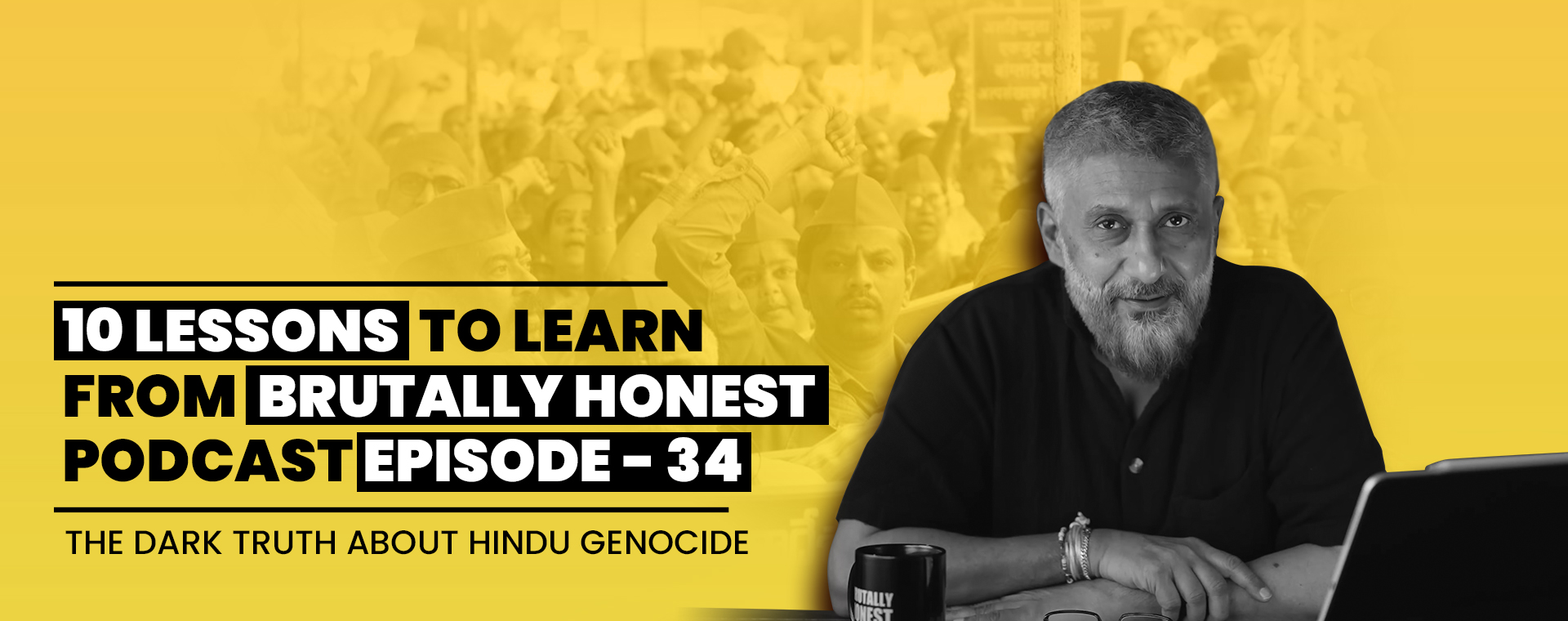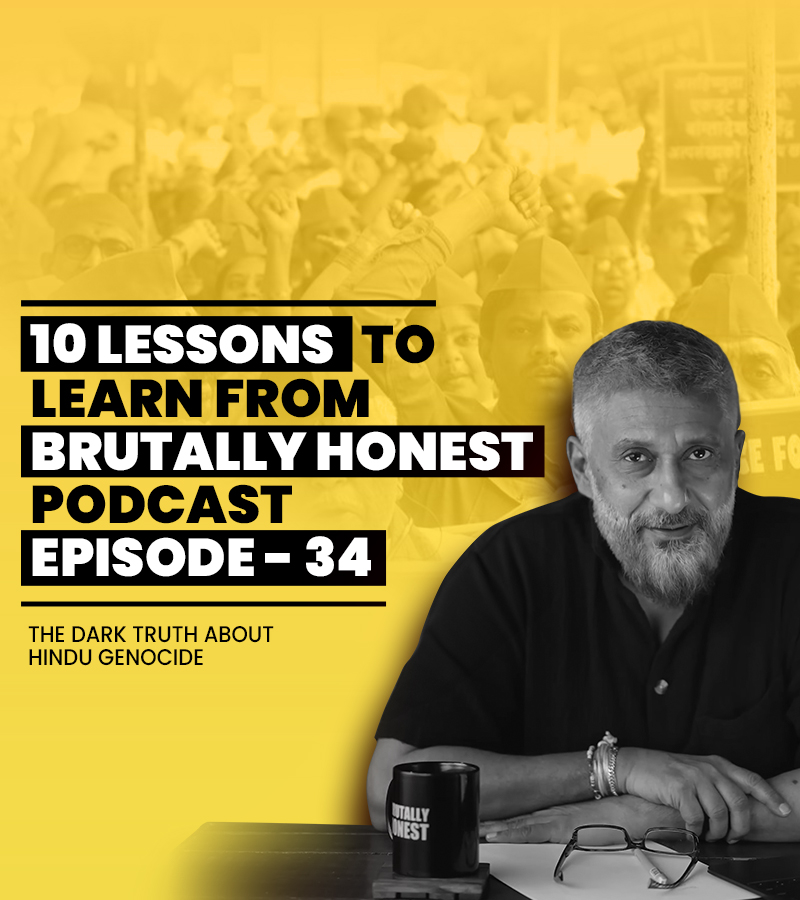

Why we need to know everything about the Hindu genocide?
Discover important facts by questioning familiar stories and unearthing truths that were kept secret for a sustained period.
Have you ever wondered if history holds untold truths? #BrutallyHonest, Episode 34 ‘The Dark Truth of Hindu Genocide’ uncovers a story that many choose to overlook. Vivek Ranjan Agnihotri’s perspective highlights how even the most painful events of the past continue to shape our present. Here are 10 key takeaways that confront these brutal truths and challenge us to question, reflect, and seek a deeper understanding. You can watch the complete episode here.
1. Revealing Historical Changes
History is not a fixed record but a living narrative controlled by those in power. The episode shows how influential people and the ruling classes have removed or altered extreme pain and suffering from historical records. It asks us to think about the mechanisms through which these voices were silenced and not just the ‘what’ but the ‘why’ of the rewriting of history. This deeper questioning makes us think about the long-term impact of these changes on our understanding of the past.
2. Hidden Histories
For decades, many accounts of mistreatment and injustice have been buried under sanitised mainstream narratives. The episode highlights the importance of bringing these hidden histories to the surface, as our understanding of the past is incomplete without the untold stories. Agnihotri says we must recognise these unshared stories to get a complete and accurate understanding of historical events. By exploring these neglected narratives, we can honour the suffering of the marginalised and build a more inclusive historical record.
3. Colonialism
Colonial powers exploited territories and people and rewrote history to justify and perpetuate their power. This part of the episode examines how colonial rulers deliberately changed historical narratives to downplay or hide their exploitation. These changes were not accidental but strategic to legitimise their rule and silence dissent. By understanding the extent of these changes, we can see the distortions that still shape our understanding of historical events today.
4. Political Use of History
Different groups use history to shape public opinion rather than tell the truth about the past. The episode examines how political agendas can select which historical facts to present to serve current interests, not truth. This manipulation of history is key for those seeking a genuine narrative, as it forces us to question the accepted versions of history. By challenging these political versions of history, we can get a more accurate and complex understanding of our collective past.
5. Media View and Historical Stories
Mainstream media simplifies complex historical events into bite-sized soundbites, which can obscure the real depth and complexity of the story. The episode shows that we need to look beyond the surface level of what’s presented by traditional media outlets and engage with the complexity of the narrative. So we can have a richer conversation that bridges the gap between public perception and historical reality.
6. Loss of Cultural Memory
When historical events are ignored or misrepresented, they greatly impact how communities understand and value their heritage. The episode shows that this loss of cultural memory gradually unravels the ties that bind generations together as future communities struggle to connect with their roots. This erosion not only diminishes a shared sense of identity but also weakens the cultural glue that holds society together. We need to recognise and preserve these moments for a strong cultural legacy that honours the past and guides the future.
7. The Invisible Hand of History
History is rewritten for economic reasons, where financial gain and political advantage trump factual accuracy. The episode shows that historical narratives are manipulated to serve vested interests whenever there’s a buck to be made. These financial and political agendas can overshadow the pursuit of truth, and we get a distorted version of events that benefits the few. By exposing these economic motivations, we need to question the sources of our historical knowledge and strive for transparency and integrity in how history is recorded and remembered.
8. An Essay on History Remembered and Forgotten
One of the best parts of the conversation is when Agnihotri talks about the emotional impact of an ignored past on individuals and communities. His points remind us that history goes beyond dates and records; it has personal and collective meaning that shapes who we are. By acknowledging the emotion of forgotten events, we understand that our shared history is a living, breathing force that shapes our values and guides us.
9.Busting the Single Story
When told from the perspective of those in power, history becomes a one-dimensional story. We must challenge these stories by actively seeking out the voices and experiences that have been silenced or ignored. Using multiple sources and lines of inquiry deepens our understanding of the past and gives us a more complex and richer view of history – one that honours every layer of human experience.
10. Why Truth Matters Today
Remembering and understanding the past goes way beyond just memories; it’s vital in not repeating past mistakes. When we uncover hidden stories and acknowledge all of our history, we have the knowledge to advocate for justice and change. This commitment to truth kicks the habit of selective storytelling and allows us to build societies that value transparency, accountability, and a deep, collective learning from the past.
Way Forward
A complete grasp of history will help us become a more conscious and accountable society. When elements of the past are overlooked or rewritten, it has implications that go beyond the history books; it shapes cultural identity and social attitudes, and ultimately determines how future generations view their world.
This conversation is an opportunity to think critically about history, look for diverse perspectives and support efforts to expose buried truths. Honest discussions, thorough research, and a commitment to learning are vital for preserving a more accurate and inclusive historical record.
We inherit narratives that leave us unprepared for the task, so we learn, on the scale of one generation, to see this is what history really is.






